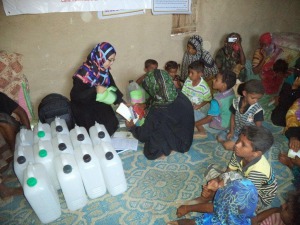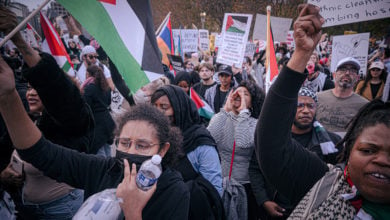
In the midst of Yemen’s severe humanitarian crisis and multi-party civil war, it currently appears that the Houthi forces have been driven from Aden in the South. Fighting currently centers on Ibb province, an agricultural region in the center of Yemen, and on Taiz, a culturally important city south of Sana’a. Sana’a, the country’s main capital in the more populous North, remains under the Houthis’ control.
As we have described before, Yemen has been in the throes of a multi-party civil war. The bourgeois media depiction of conflict between forces loyal to the exiled government (backed by Saudi Arabia) versus the Houthis vastly oversimplifies the Yemeni reality. The central government, whether headed by former long-time president Ali Abdullah Saleh or current exiled president Abd Rabbuh Mansur Hadi, has generally only been able to control the cities and main roads of the country. During the tenure of Saleh, the central government maintained control of the entire nation through collaboration with the tribal leaderships; Saleh was infamous for his ability to play tribes off against each other to maintain the upper hand.
However, following the Arab Spring, a movement arose to depose Saleh, and he eventually was replaced by Hadi. Meanwhile, the Houthis, a semi-tribal, semi-religious grouping in the North, had been engaged in a struggle for greater autonomy in their region. This eventually led to the Houthi incursion into the capital of Sana’a and drive to control the entire country. At the same time, Al-Quaeda in the Arab Peninsula and Sana’a Province, an ISIS affiliate, have emerged as forces on the ground, some with relationships of their own to local tribal forces. Nor can we neglect to mention the movement in the South of Yemen for secession, in which a disparate grouping of socialists, Islamists and others have sought independence for the former socialist South.
Further complicating this picture, former President Saleh, once engaged in repressing the Houthis, has now joined forces with them. On the other hand, elements of the southern secessionist movement have allied with Saudi-backed militias and forces still loyal to the Hadi government to drive the Houthis out of the South.
Houthis a ‘proxy’ for Iran?
It was in this context of the civil war that the Saudis intervened decisively in favor of the exiled Hadi government and against the Houthis. The Houthis are practitioners of Zaydi Shi’ite Islam, a form only found in Yemen. The simplistic media coverage makes much of the Shi’ite character of the Houthis, and uses this fact to draw a direct connection to Iran, claiming that the Houthis are a “proxy” for Iran in Yemen. This is undoubtedly lazy journalism or worse.
“I think what is happening is that Houthis and the Iranians have common interests, but there’s very little good journalism that’s been done to uncover the true extent of that relationship between the Houthis and Iran,” Safia Al-Ahmad, a journalist who produced a documentary on the Houthis for PBS Frontline told PBS journalist Gwen Ifil in April.
Ahmad said: “they do have a connection, but not to the extent that is being covered in the media at the moment by describing them as a Shia militia backed by Iran. I think that’s an overstatement.”
This viewpoint is supported by revelations in April by U.S. intelligence officials that Iran had warned the Houthis against taking over the Yemeni capital. (Huffington Post, April 20) The view that the Houthis are a proxy for Iran in Yemen has been advanced by neo-conservative forces opposed to the Iran nuclear deal, as well as by the Gulf Cooperation Council states, headed by Saudi Arabia, which is currently embroiled in the brutal anti-Houthi intervention in Yemen that has killed over 4,000 people and led to a severe humanitarian crisis.
Humanitarian crisis
Doctors Without Borders (MSF) reports that it has treated more than 10,000 people injured in the war in Yemen since March, including close to 5,000 who underwent surgery. Some hospitals have had to turn people away due to lack of medical staff and shortages of fuel, electricity and water.
Yemen is “crumbling” according to Peter Maurer of the International Council of the Red Cross, who called for free access to deliver life-saving food, water and medicines after a three-day visit to Yemen. “The humanitarian situation is nothing short of catastrophic. Every family in Yemen has been affected by this conflict. … The world needs to wake up to what is going on,” Maurer said in a statement.
Role of the U.S.
This horrible situation in Yemen is at least in part a product of the United States’ heedless policies in the Middle East, in which it has overthrown or attempted to overthrow stable but independent governments and fanned the flames of sectarianism. U.S. imperialist policies laid the ground for the growth of ISIS, now found in Yemen in the form of a new group called Sana’a Province.
In the past, one could safely say that Saudi Arabia would not have taken action against Yemen without the go-ahead from the U.S. Now it is not so clear. The U.S. is providing support to Saudi Arabia in its brutal air campaign against Yemen, but the intervention appears to be a Saudi initiative that is being supported by the U.S. out of diplomatic necessity rather than enthusiastic agreement.
Further complicating the role of the U.S. in these current developments, the U.S.recently concluded nuclear negotiations with Iran. Some elements of the U.S. ruling establishment see Iran as a stabilizing if independent force in the region, and are seeking to dial back the most extreme “Axis of Evil” rhetoric and policies towards the Islamic Republic, while the most extreme neo-cons in the U.S. foreign policy establishment wish to continue the demonization and isolation of Iran. In any event, U.S. policy vis-a-vis Yemen and the region does not appear to be particularly well thought out, although the ends are always the same: maintenance of imperialist hegemony.
Regardless of the shifting winds of U.S. policy towards Yemen and the rest of the region, the fact remains that Yemen is in the midst of a devastating civil war made far worse by the intervention of its vastly richer neighbor with the backing and support of the United States. The U.S. also maintains its so-called right to engage in drone strikes against even U.S. citizens living in sovereign Yemeni territory. All progressive people should call for an end to the Saudi intervention in Yemen and defend Yemenis’ right of self-determination.





